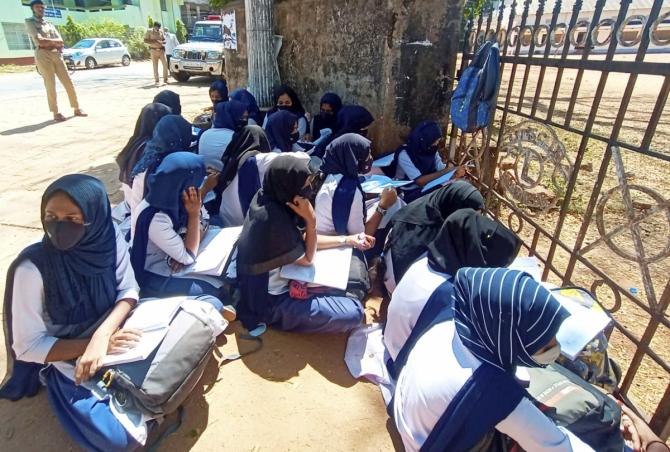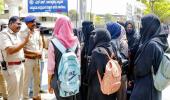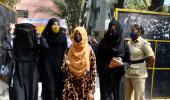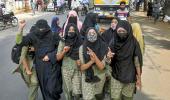The meandering 10-day arguments on Karnataka's hijab row concluded on Thursday, with the counsel for Muslim petitioners making a last gasp effort to have the ban on the Islamic headscarf in classrooms lifted, insisting the state should be concerned more about education than an apparel.

They also flagged the pet 'Beti Bachao, Beti Padhao' slogan of Prime Minister Narendra Modi to buttress their point of women empowerment while remonstrating alleged attempts at stopping Muslim girls from attaining education by banning the hijab.
A number of counsel for the Muslim girls insisted during the often abrasive arguments that preventing them from wearing the hijab to the classroom will put their education in jeopardy as they might stop attending classes.
After the arguments put forth by the counsel for the Muslim girls, the apex court reserved its verdict on a batch of pleas challenging the Karnataka High Court judgement refusing to lift the ban on hijab in educational institutions.
An exasperated bench of Justices Hemant Gupta and Sudhanshu Dhulia had on Wednesday asked the counsel appearing for the petitioners to wrap up their rebuttal arguments within an hour on Thursday, saying "we are losing our patience" and that there was an "overdose of hearing".
"We will give one hour time to all of you. You finish that. Now, it is an overdose of hearing," the judges had told senior advocate Huzefa Ahmadi.
The counsel appearing for the petitioners argued on various aspects, including on the state government's February 5, 2022 order which banned wearing clothes that disturb equality, integrity, and public order in schools and colleges.
Ahmadi, appearing for some of the petitioners, told the bench the state has not been able to point out as to which fundamental right of other students was infringed on account of Muslim girl students wearing the hijab.
"The target is only a headscarf and it does not take too much of an enquiry to know which community wears a headscarf," he said, adding that a circular may purport to be neutral without being so. He was referring to the February 5 order of the state government which had no mention of the hijab.
Ahmadi said the state should be more concerned about education being imparted to the maximum, especially to girl students, but here the state appears to be more concerned about discipline.
"You have a slogan 'Beti Padhao', both at the state level and central level. Now, should there be a conflict between discipline and this legitimate state interest of education?" he asked.
"And should not the state be more concerned about educating these ladies rather than stopping them only on account of this display of a particular religious symbol," Ahmadi said in his rejoinder arguments, while assailing the rival side for their contention that the school uniform was a symbol of discipline.
Arguing that education is empowerment, Ahmadi said if these students get better education, they can make a conscious and informed decision in future on how they want to dress.
"This stopping will result in them going back to other kind of education which is not secular," he said, obliquely referring to Madarassas or Islamic seminaries. "Do not stop them at the threshold," he fervently appealed.
Besides Ahmadi, several lawyers including senior advocates Dushyant Dave, Salman Khurshid, Devadatt Kamat, Sanjay Hegde and advocate Shoeb Alam also advanced their submissions.
Dave referred to the submission of Solicitor General Tushar Mehta, who while arguing for the state had accused Muslim hardline outfit the Popular Front of India (PFI) of having started a social media campaign on the hijab designed to create an agitation based on "religious feelings of the people".
"I regret to say that the solicitor raised that issue," Dave said, adding the February 5 circular issued by the state had no reference to the PFI.
Dave argued nobody contested wearing hijab earlier.
"Whether uniform was there or not, that is actually not the issue. The issue is not uniform. The issue is whether you are permitting someone to wear hijab or not," the bench observed.
Counsel for the girls, during the arguments, had suggested they be allowed to wear the hijab in addition to the school uniform.
The bench, citing the arguments advanced by the state, said many practices exist but not all become an essential religious practice. Responding to the contention, Dave said wearing the Islamic headscarf is an individual's choice.
During the course of the windy and often rancourous arguments, Salman Khurshid, a senior Congress leader and eminent lawyer, who appeared for the petitioners, said arguments have been advanced about the religious practice of wearing hijab but the issue also involves conscience, culture, identity and privacy.
"Now our homework starts," the court said, having concluded the arguments, often marked by bellicosity on both sides.
The judgement in the matter is likely to be delivered by October 16 as Justice Gupta, who heads the bench, is due to retire that day.
On March 15, the high court had dismissed petitions filed by a section of Muslim students of the Government Pre-University Girls College in Karnataka's Udupi seeking permission to wear the hijab inside classrooms, ruling it is not a part of the essential religious practice in Islamic faith.
The apex court was hearing a clutch of petitions challenging the high court verdict.
During the hearing before the top court, some of the counsel appearing for the petitioners suggested that the matter be referred to a five-judge constitution bench.
Asserting that hijab is the "identity" of Muslims, one of the petitioners' advocates had said various acts of ommission and commission like Karnataka's headscarf controversy showed a "pattern to marginalise the minority community".
The counsel for Karnataka, however, insisted the state government's circular was "religion neutral" with no reference to the hijab.












 © 2025
© 2025